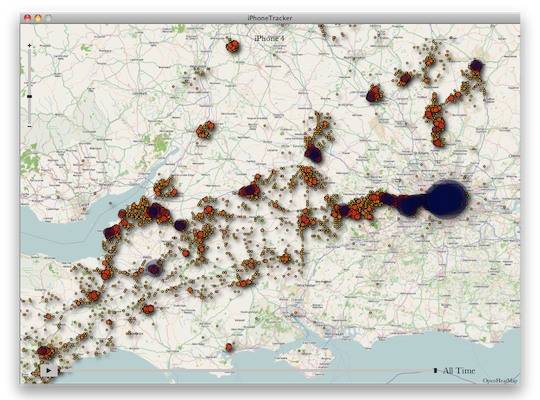University of Pittsburgh researchers have assembled a key piece of tech that will help enable a future generation of extremely powerful quantum computers as well as advanced electronic materials and better computer memories. Their single-electron transistor is the first of its kind made entirely from oxide-based materials, an important aspect that allows it to work as a solid-state memory. More
Toshiba Notebook First To Simultaneously Display 2D And 3D Images On One Screen
Toshiba’s Regza tablet wasn’t the only computer-related device the company introduced today: the dynabook Qosmio T851/D8CR is what big T says the world’s first notebook that can produce 2D and 3D images simultaneously, on one screen. The 2D images have 1,920×1,080 resolution, while users can view pictures in 3D in 1,366×768 resolution – no glasses required.
Spec-wise, buyers can expect:
- 15.6-inch, naked-eye 3D LCD screen with partial 3D display function
- Core i5-2410M CPU (2.3GHz)
- 8GB RAM
- 750GB HDD
- Intel HM65 Express chip set
- BDXL-compatible Blu-ray drive
- digital TV tuner
- 1MP web cam
- Windows 7 Home Premium 64bit OS
- one USB 3.0 slot, three USB 2.0 slots, an HDMI slot
- IEEE 802.11b/g/n Wi-Fi
- Bluetooth 3.0+HS
Toshiba plans to start shipping the new Qosmio in Japan in July for $2,780 (no word yet regarding an international release).
Excerpt from:
Toshiba Notebook First To Simultaneously Display 2D And 3D Images On One Screen
When You Cancel Your Magazine Subscription on Your Kindle, Your Back Issues Disappear Too (Updated With Correction) [Kindle]
Consider this to be your dismaying PSA of the day: Apparently, if you're a Kindle owner with a magazine subscription, and you decide to stop subscribing, the back issues you previously downloaded are also lost—for good. More
iOS devices secretly log and retain record of every place you go, transfer to your PC and subsequent devices

Security researchers presenting at the Where 2.0 conference have revealed a hidden, secret iOS file that keeps a record of everywhere you’ve been. The record is synched to your PC and subsequently resynched to your other mobile devices. The file is not transmitted to Apple, but constitutes a substantial privacy breach if your PC or mobile device are lost or seized. The researchers, Alasdair Allan and Pete Warden, have released a free/open application called “iPhone Tracker” that allows you to retrieve the location data on your iOS device and examine it. They did not discover a comparable file on Android devices.
The file contains the latitude and longitude of the phone’s recorded coordinates along with a timestamp, meaning that anyone who stole the phone or the computer could discover details about the owner’s movements using a simple program.
For some phones, there could be almost a year’s worth of data stored, as the recording of data seems to have started with Apple’s iOS 4 update to the phone’s operating system, released in June 2010.
“Apple has made it possible for almost anybody – a jealous spouse, a private detective – with access to your phone or computer to get detailed information about where you’ve been,” said Pete Warden, one of the researchers.
iPhone keeps record of everywhere you go
See the article here:
iOS devices secretly log and retain record of every place you go, transfer to your PC and subsequent devices
Biggest Spider Fossil Ever Found

The fossil itself is not as big as this picture.
The spider, a new species called Nephila jurassica, stretches about two inches from end to end. It was found in a fossil-rich rock formation near Daohugou village in northeastern China. The fossil dates back to the Middle Jurassic, about 165 million years ago, researchers reported in the April 20 Biology Letters.
Spiders from the same family still exist today. Female giant golden orb-weaver spiders can grow to a whopping 4 or 5 inches in diameter (although males tend to be less than a quarter that size). These spiders are known for spinning huge webs of golden silk and have been known to trap bats and small birds.
Spider fossils are very rare, and this discovery leads scientists to believe that the Nephila genus is 130 million years older than previously thought. Link
(Image credit: Paul Selden)
Visit site:
Biggest Spider Fossil Ever Found
Toshiba Announces Battery-Powered Regza TV
 Do you remember the battery-powered REGZA PC1 Power TVs Toshiba announced for certain emerging markets last November? Today, the company said in Tokyo it plans to launch a similar (but different) 19-inch LCD Regza TV
Do you remember the battery-powered REGZA PC1 Power TVs Toshiba announced for certain emerging markets last November? Today, the company said in Tokyo it plans to launch a similar (but different) 19-inch LCD Regza TV
Kindle Library Lending will let you take books out on your e-reader or Kindle app, launching in US this year
We love books. We just don’t love carrying more than one of them around. It’s great to hear, then, that Amazon has figured out a new Kindle Library Lending feature, which will allow US customers to check the ethereal form of books into their Kindle (all generations are supported) or Kindle app-equipped smartphone or computer. Annotations will be retained, in case you decide to take the book out a second time or purchase it through Amazon, in which case they’ll come flooding back in like fond memories of a good read. The service matches Sony’s similar ebook library checkout offering, which is no coincidence as it’s powered by the same company, OverDrive. It’s set to launch later this year and you can read more about it in the press release after the break.
Kindle Library Lending will let you take books out on your e-reader or Kindle app, launching in US this year originally appeared on Engadget on Wed, 20 Apr 2011 09:29:00 EDT. Please see our terms for use of feeds.
Lion Skin Pack Turns Windows 7 into Mac OS X Lion [Customization]
If you like the new look of Lion, you’re out of luck on a Mac but oddly in luck if you own a Windows 7 PC. Lion Skin Pack is an easily installable set of GUI customizations for Windows 7 that make Windows look just like the next generation Mac operating system. More
SSD Showdown: 4 Top Drives Reviewed [Republished]
ACLU Looking Into Mobile Phone Scanner Being Used By Michigan Police

Now, although there is likely to be a little flare-up of concern regarding this issue over the next couple days, it’s not so much the potential privacy breach I’m worried about as not knowing what tools the police have at their disposal. In this case, although this device might potentially be used for less-than-ethical purposes, the important part is simply raising awareness of the availability of such a device and how it pertains to your rights.
The report concerns a device, apparently Cellbrite’s UFED Physical Pro, billed as a “mobile forensics” tool. It basically does everything it can to get by security measures on phones to access call records, pictures, and so on. Very useful, as you can imagine, in an investigation where, say, a kidnapping victim’s phone might reveal their last location.

But the ACLU is concerned the devices could be used (though I see no suggestion that they are) on routine traffic stops after coercing drivers or passengers into surrendering their phones. Certainly a potential risk, but not one that appears to have occurred much, if at all. They’re useful devices that could easily be misused &mdsah; kind of like guns, which of course we don’t allow police to have, right?
The more troubling part is that the police are asking for half a million dollars to share information on the program. Now that’s ridiculous. We should all know our rights well enough to refuse an unreasonable search, but it’s important to know what the police may ask of us as well. The police are public servants and should serve this information up publicly as soon as they are asked.
Taxpayers need to know how their money is being used, and as citizens, we should know how our laws are being enforced, how the information acquired is kept private, and so on. It’s as simple as that, and with luck the courts will bear it out.
[via Reddit and The Truth About Cars]
Read the article:
ACLU Looking Into Mobile Phone Scanner Being Used By Michigan Police






